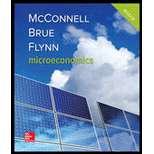
The opportunity cost and its relevance to economics.
Explanation of Solution
Since the opportunity cost is the next best alternatives, it is the given up benefit in order to obtain some other benefits.
Resources are scarcely available to satisfy the human needs. The reason is that the human needs are unlimited. The resources can be used for different purposes.
For example, Land is limited in availability and assumes that the land is used for cultivating of wheat and rice. If the land is used to cultivate wheat, then rice production has to been given up from that particular land. Thus, the scarcity of resource creates the opportunity cost. If available resources are enough to satisfy the human needs, then there is no opportunity cost.
The revenue generated from the land located at the center of New York City, is greater than the revenue generated from the land that located at suburb. If the mall is build, then it can generate more revenue than the revenue generated from the parking lot. At the same time, the revenue generating from the mall that located at suburb is lower than the mall located at centre of the New York City. Thus, the opportunity cost of building a parking lot at New York City is greater than the building a parking lot at suburb.
Concept introduction:
Opportunity cost: Opportunity cost refers to the given up benefits in the process of obtaining some other benefit.
Want to see more full solutions like this?
Chapter 1 Solutions
Microeconomics
- Answerarrow_forwardM” method Given the following model, solve by the method of “M”. (see image)arrow_forwardAs indicated in the attached image, U.S. earnings for high- and low-skill workers as measured by educational attainment began diverging in the 1980s. The remaining questions in this problem set use the model for the labor market developed in class to walk through potential explanations for this trend. 1. Assume that there are just two types of workers, low- and high-skill. As a result, there are two labor markets: supply and demand for low-skill workers and supply and demand for high-skill workers. Using two carefully drawn labor-market figures, show that an increase in the demand for high skill workers can explain an increase in the relative wage of high-skill workers. 2. Using the same assumptions as in the previous question, use two carefully drawn labor-market figures to show that an increase in the supply of low-skill workers can explain an increase in the relative wage of high-skill workers.arrow_forward
- Published in 1980, the book Free to Choose discusses how economists Milton Friedman and Rose Friedman proposed a one-sided view of the benefits of a voucher system. However, there are other economists who disagree about the potential effects of a voucher system.arrow_forwardThe following diagram illustrates the demand and marginal revenue curves facing a monopoly in an industry with no economies or diseconomies of scale. In the short and long run, MC = ATC. a. Calculate the values of profit, consumer surplus, and deadweight loss, and illustrate these on the graph. b. Repeat the calculations in part a, but now assume the monopoly is able to practice perfect price discrimination.arrow_forwardThe projects under the 'Build, Build, Build' program: how these projects improve connectivity and ease of doing business in the Philippines?arrow_forward
 Economics (MindTap Course List)EconomicsISBN:9781337617383Author:Roger A. ArnoldPublisher:Cengage Learning
Economics (MindTap Course List)EconomicsISBN:9781337617383Author:Roger A. ArnoldPublisher:Cengage Learning
 Principles of MicroeconomicsEconomicsISBN:9781305156050Author:N. Gregory MankiwPublisher:Cengage Learning
Principles of MicroeconomicsEconomicsISBN:9781305156050Author:N. Gregory MankiwPublisher:Cengage Learning Principles of Economics 2eEconomicsISBN:9781947172364Author:Steven A. Greenlaw; David ShapiroPublisher:OpenStax
Principles of Economics 2eEconomicsISBN:9781947172364Author:Steven A. Greenlaw; David ShapiroPublisher:OpenStax Exploring EconomicsEconomicsISBN:9781544336329Author:Robert L. SextonPublisher:SAGE Publications, Inc
Exploring EconomicsEconomicsISBN:9781544336329Author:Robert L. SextonPublisher:SAGE Publications, Inc





